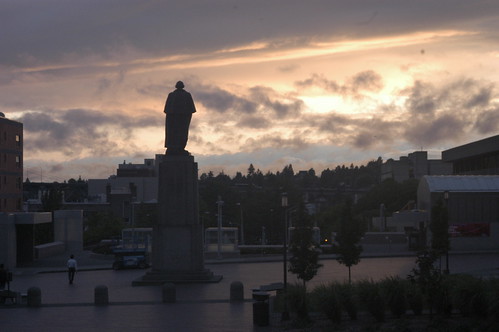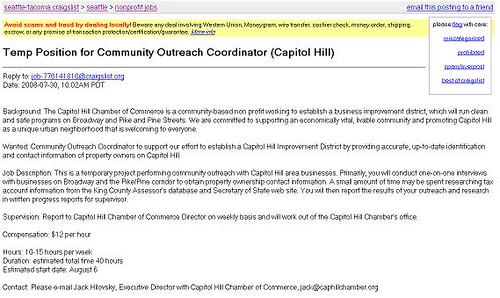Friday, August 1, 2008
Behind Deadline?
But neither the committee's Web site nor the Chamber's Web site has a copy. As of two weeks ago, Dennis Sellin of Lunde Consulting, the company hired to facilitate the committee, had never seen the report or heard its status.
Is it possible that the Chamber is still working on it? This Craigslist ad, posted July 30 suggests so:
Thursday, July 31, 2008
It's Not Just a Bagel
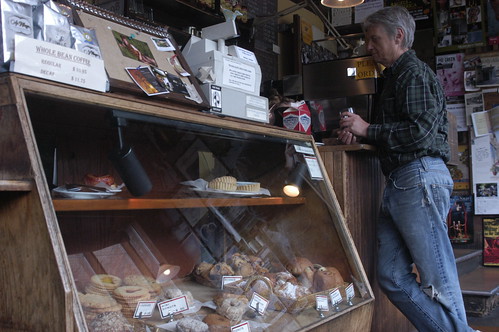 International trade disputes , famine, and droughts have brought food production to the forefront of global consciousness. Gas prices remain high, and senators continue to call for approval of off-shore drilling.
International trade disputes , famine, and droughts have brought food production to the forefront of global consciousness. Gas prices remain high, and senators continue to call for approval of off-shore drilling.These problems may seem far-flung, but local cafes and bakeries have noticed too. Wheat product and fuel prices are affecting business relations in surprising ways as local companies adjusts to the price increases.
The U-District's Cafe Allegro decided to change bagel suppliers when their original supplier — Noah's Bagels, a national chain — added a $15 delivery surcharge on top of earlier bagel hikes.
"It would have more than doubled the cost," says Chris Peterson, Allegro co-owner, explaining that they only order $12–$15 of bagels per order. "I think they just decided that wholesale bagel sales were not profitable."
A couple of weeks ago Bulldog News & Espresso, the tiny espresso stand operating out of Bulldog News on University Way, stopped buying bagels all together. Barista Arielle Kloss says there wasn't enough demand to keep buying their usual 10–15 bagels from the Seattle Bagel Deli.
"It's hard, it's very hard," says Dennis Ballen, owner of Blazing Bagels in Redmond. "Gas is killing us." His business had to raise the price of their bagels in March, when wheat futures spiked and the cost of a 50-lb bag of flour nearly doubled to about $24. Ballen says his bakery has been able to deal with rising flour prices, but it's the gas that really worries him.
Fuel costs are pinching Blazing Bagels and other bakeries who distribute their own product as their wholesale distributors add or increase delivery surcharges. Ballen noticed one day that the surcharge for one delivery had jumped from $1.50 to $6 — an increase he says really builds up because he receives several shipments a week from several different suppliers.
Ballen has tried not to pass it on to his wholesale customers — he delivers anywhere in the Puget Sound area for $1.50 — but at this point, “The more companies that want to distribute my product, the better," he says.
"A lot of small bakeries go out of business because of the distribution. It can really hurt ya," observes James Morse, owner of Little Rae's, a bakery that distributes Blazing Bagels. Morse says when he tried to add a delivery fuel charge a few months ago, "people didn't really like it and accused us of being a part of OPEC."
Morse doesn't quite understand why Noah's increased their prices so much, explaining, “the bigger you are, the easier it is to keep your cost down.” He says smaller bakeries have to strategize to reduce costs.
“One thing we have a good system for, is we do our deliveries in the middle of the night. We get to move freely throughout the night,” Morse reveals, which serves the double purpose of avoiding traffic and getting bagels there early in the morning. Blazing Bagels delivers then too, from 1am-7am in the morning.
Not all of Noah's customers have switched, however. The owner of Cafe on the Ave, Song, who did not give his last name, says that he debated changing vendors a few months ago after a 10–15 cent price increase per bagel, but in the end decided not to.
"I'd rather carry Noah's because their quality is better," Song explains. He accepts the delivery surcharge too, pointing out that other distributors just incorporate the cost of fuel into their product prices, instead of keeping it separate.
Song says that he and other cafe owners are trying hard not to pass the buck on to their customers, but at some point they'll have to.
“Historically, we have never had to [make] two price increases in a year,” says Anna Li, Director of Sales and Marketing for Essential Baking, which bakes pastries and distributes for Bagel Oasis. Essential is particularly vulnerable to price hikes because of their commitment to organic flour and biodiesel, which are at least 50 percent more expensive than regular flour and gas.
Li sees both businesses and individuals adapting to increasing costs, and that means finding ways to work smarter, not just pass the hikes down the line.
"I think honestly, it’s just an adjustment,” Li contends. “Americans are very lucky to spend so little on their food.”
Presidential- Sweet!
Well wonder no longer folks, cause here it is:
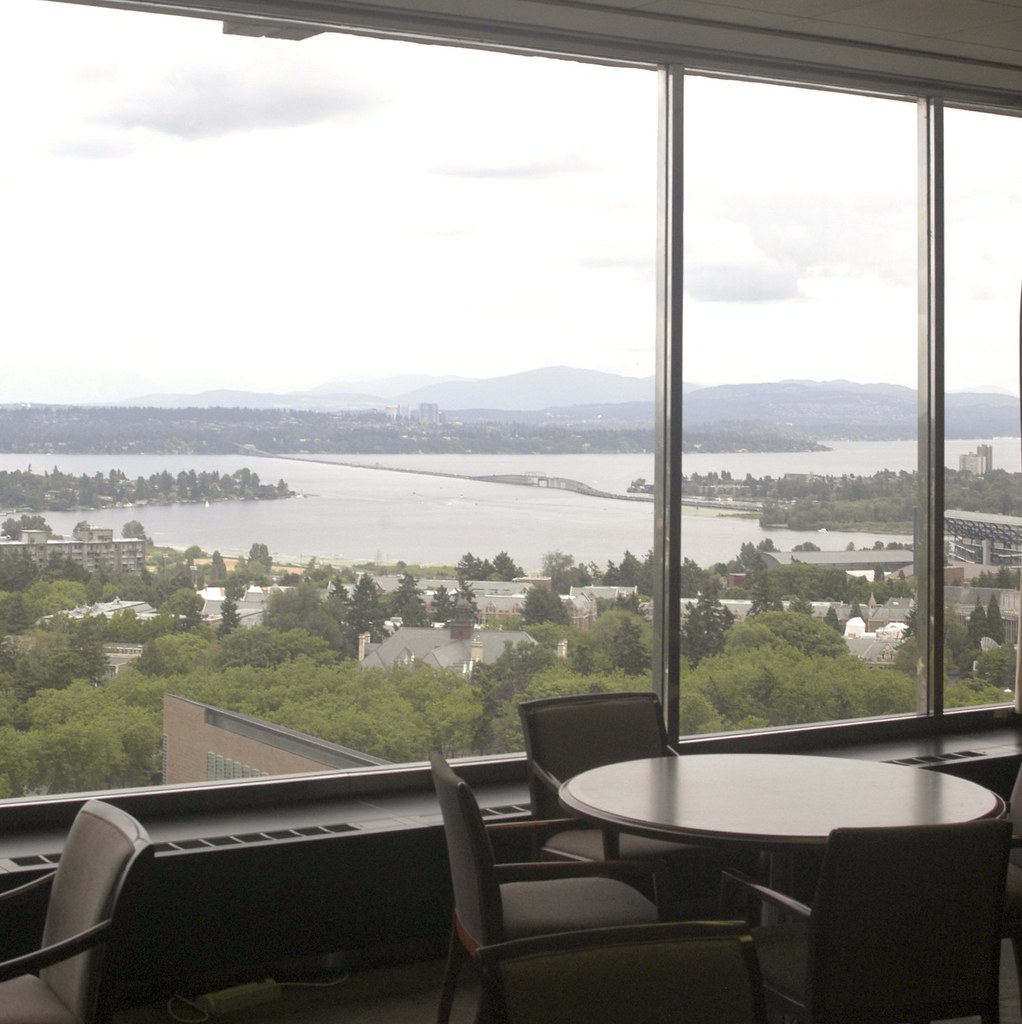 Yup, that's SR-520 and a corner of the Husky Stadium. I bet he can see the Cascades on the right day too. Well, he will be able to, when he moves in.
Yup, that's SR-520 and a corner of the Husky Stadium. I bet he can see the Cascades on the right day too. Well, he will be able to, when he moves in.These pictures were taken from the 22nd floor of the newly christened University of Washington Tower, formerly the Safeco Tower.
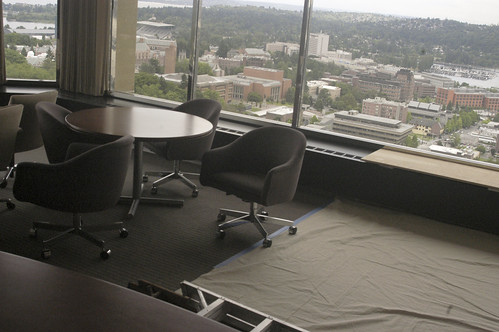 The building is still under construction in some places and the 22nd floor is mostly desks, chairs, and empty cubicles. The building hints at the grand company Safeco Insurance once was. Wood panels cover the walls, floor-to-ceiling windows line every floor, and the lobby has a two-story tall ceiling.
The building is still under construction in some places and the 22nd floor is mostly desks, chairs, and empty cubicles. The building hints at the grand company Safeco Insurance once was. Wood panels cover the walls, floor-to-ceiling windows line every floor, and the lobby has a two-story tall ceiling. The school bought the building in September of 2006 for $130 million along with a few other properties, like the parking lot that used to house an IHOP at Northeast 44th Street and Brooklyn Avenue Northeast.
The school bought the building in September of 2006 for $130 million along with a few other properties, like the parking lot that used to house an IHOP at Northeast 44th Street and Brooklyn Avenue Northeast.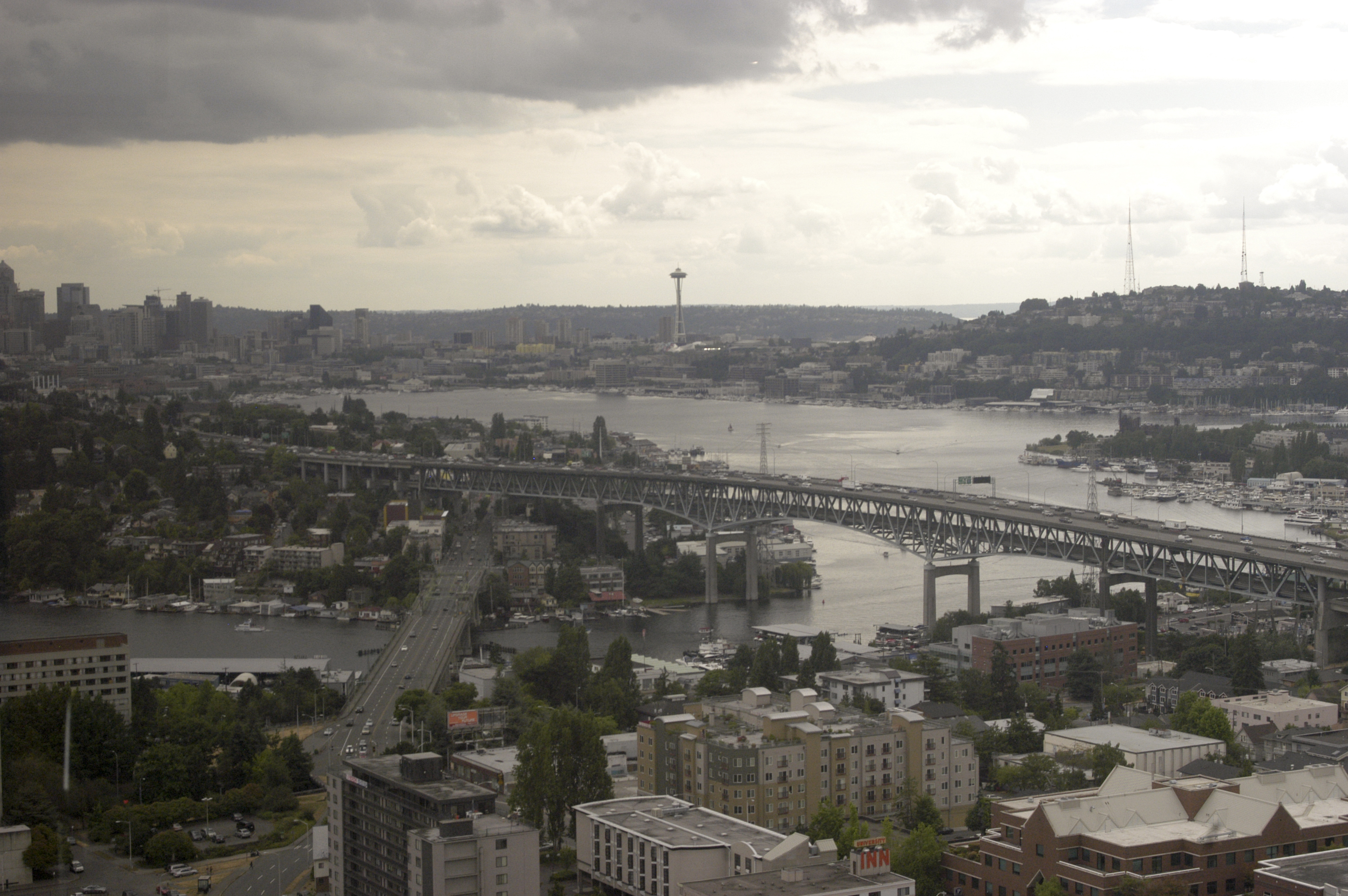 The southwest corner of the 22nd floor faces towards an complex urban landscape with crisscrossing veins of transit. The University District's Sound Transit station was to be built near the tower, but it will instead be built near Husky Stadium.
The southwest corner of the 22nd floor faces towards an complex urban landscape with crisscrossing veins of transit. The University District's Sound Transit station was to be built near the tower, but it will instead be built near Husky Stadium.Liberty Mutual, an insurance firm based in Boston, bought locally owned Safeco Insurance in April of this year. Despite the merger, Safeco CEO Paula Reynolds said that Safeco Field will retain it's name "for some time to come" in a July 29 article in The Seattle Times.
Tuesday, July 29, 2008
Green Behind City's Styrofoam Ban
It cites an annual cost of $620,ooo to the city for "collection, recycling, disposal and litter cleanup for the disposable food service items." The note also mentions that compostable containers would remove the need to sort food service garbage, which is expected to save the city money.
Not to mention the $250 fine for any establishment failing to comply.
However the City is also willing to fund the transition to the more expensive containers, which it estimates to be 5 to 1o cents more than Styrofoam ones, by helping to establish buying cooperatives.
Cedar Grove Composting appears to be the City's main destination for the food waste, and may help create "logos and/or color coding so the public cannot mistake such products for others that do not meet the established standard."
Monday, July 28, 2008
Styrofoam Containers to Go
Council Bill 116250 PASSED AS AMENDED 7 – 0Both bills come as part of the Zero Waste Strategy pushed by Councilmember Conlin and approved last July.
This bill bans the use of expanded polystyrene—Styrofoam—food containers in restaurants and grocery stores by January 1, 2009. Also under this law, in July of 2010, grocery-store foam trays for raw meat and seafood will be banned and replaced with compostable alternatives.
Council Bill 116251 PASSED AS AMENDED 6 – 1 (Drago Opposed)
This bill encourages Seattle residents to use reusable shopping bags by establishing a 20 cent green fee for disposable shopping bags at convenience, drug, and grocery stores, beginning on January 1, 2009.
Concert Diary: Capitol Hill Block Party, July 26
 Summer is the time to indulge in live music. This past weekend was no different.
Summer is the time to indulge in live music. This past weekend was no different.The Capitol Hill Block Party sold out Friday, and Saturday was packed too. The Block Party is just how Capitol Hill residents like it — lots of cheap beer and local bands, and nothing starting before 2p.m.
Kay Kay and his Weathered Underground warmed up the Main Stage for a moderate crowd.
"Ain't no mother-fucking crime committed here last year!" Kay Kay enthused, reminding people to "keep it safe." After the brief PSA, the band got down to what they do best — a fun mix of jazzy blues pop sprinkled with a little bit of soulful
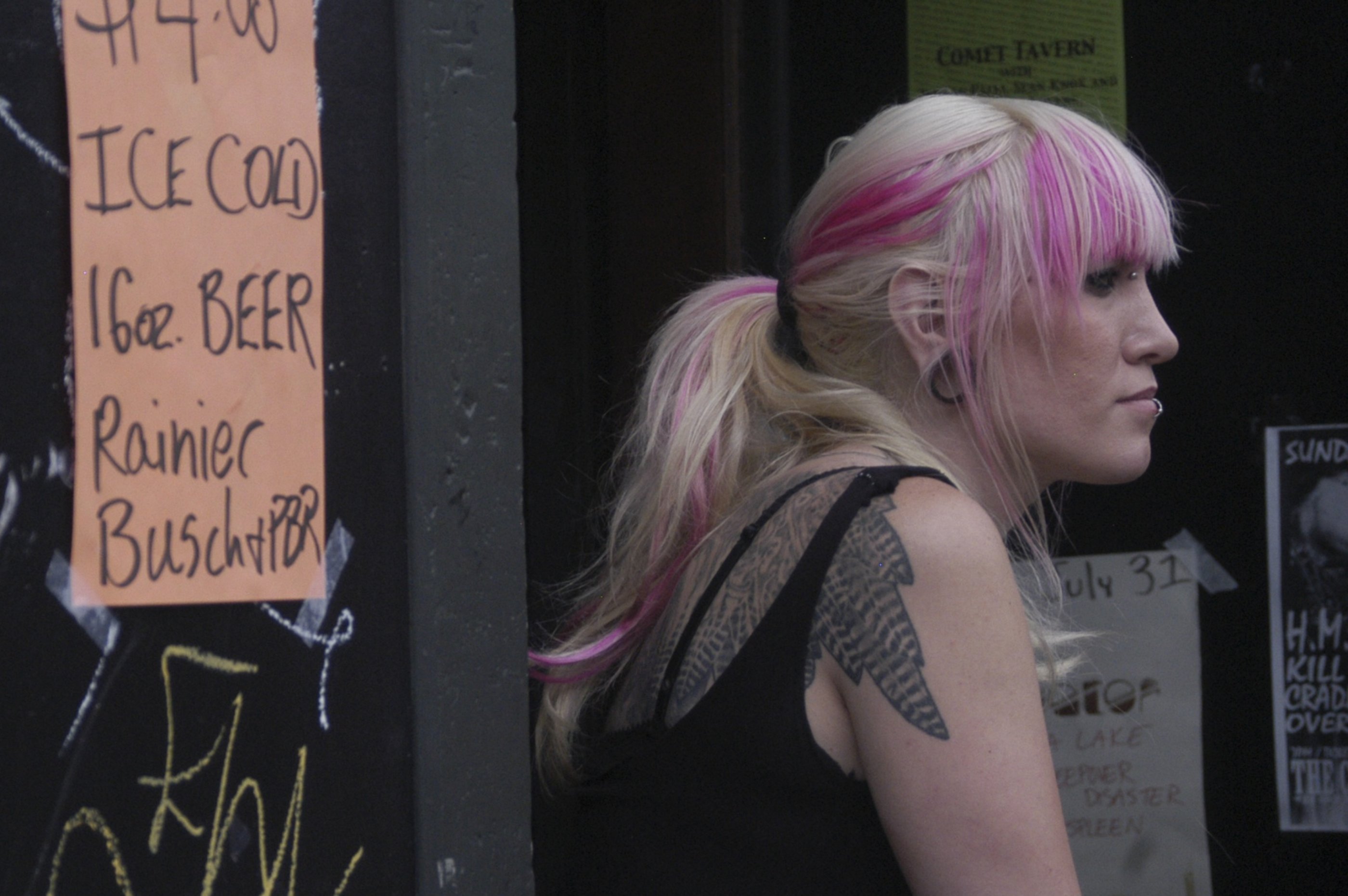 violin.
violin.The bands were spaced so that there might be half an hour or nothing between sets at different stages. Good thing there were so many other things to do, in case of the former.
People watching, photography, and drinking were popular activities. Some enjoyed all three. Ahem.
The Hands played an amazing show, energizing the dark stage inside of Neumo's. The Seat
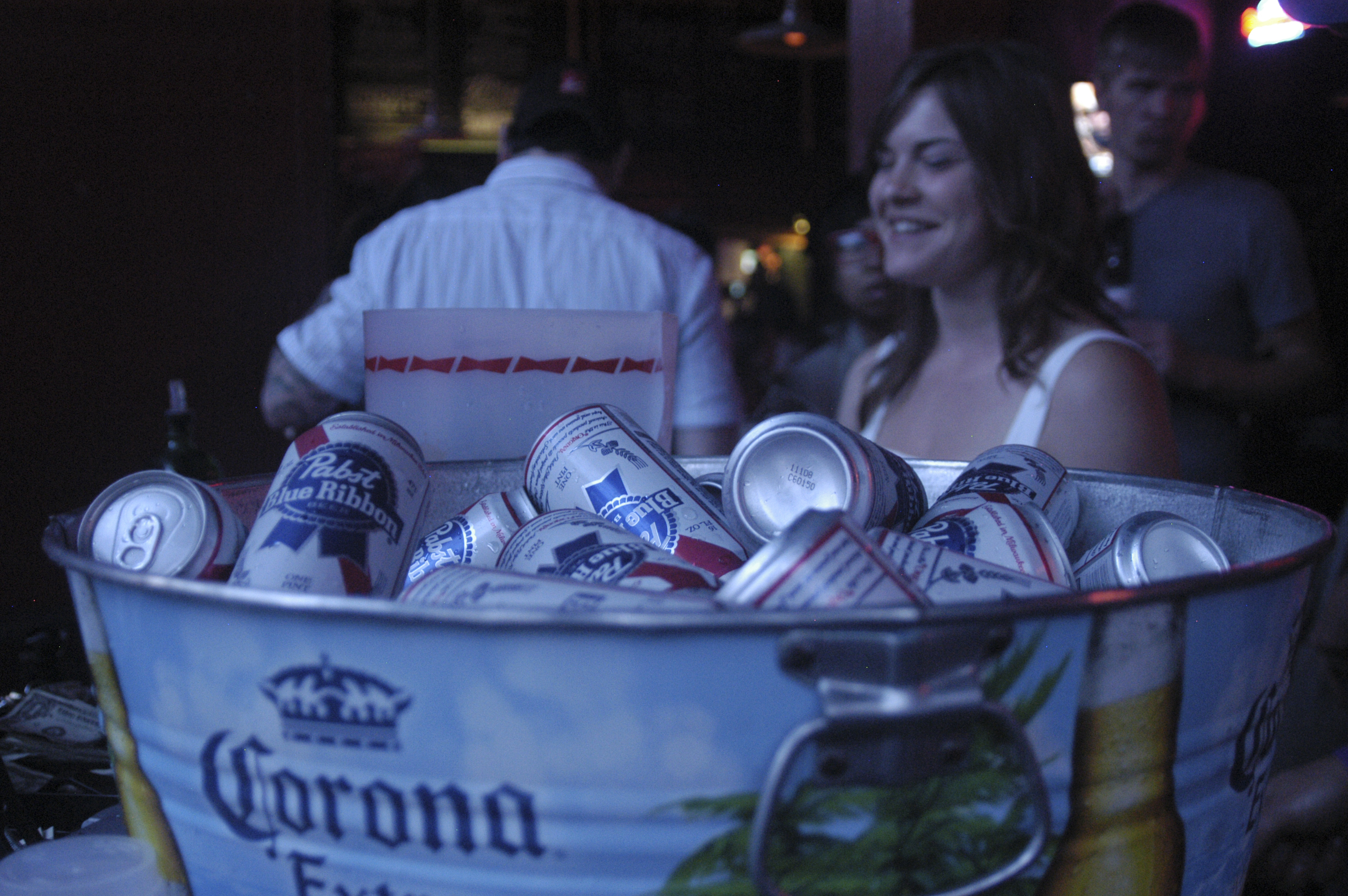 tle band has garnered well-deserved tribute from local music writers for their hard, but not-too hard-to-dance punk rock.
tle band has garnered well-deserved tribute from local music writers for their hard, but not-too hard-to-dance punk rock.A brief ramble through the main drag revealed Kimya Dawson to be charming the pants off the crowd with her cute voice and quirky songs. She said she had been scheduled to play the Block Party another year, but since she was due at any moment, her manager forbid her. She was disappointed, she said, because she'd imagined having her water break all over stage to spray down on the crowd.
In more pleasant news, Dawson also announced that she will be releasing a CD of children's songs soon.
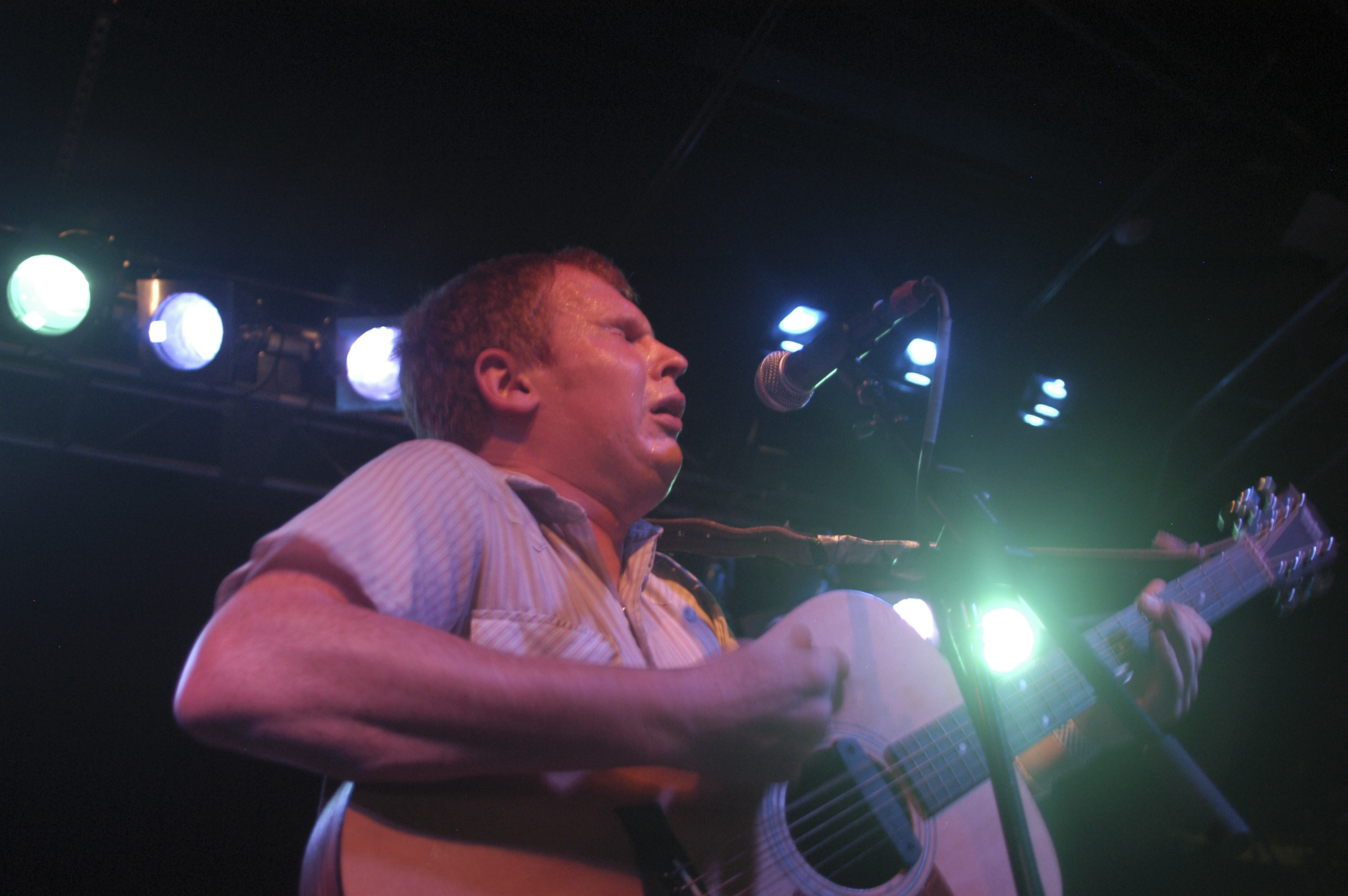
Next up was The Builders and the Butchers, a rock group from Portland with folk and country influences. One group of fans had come from Portland to see the band, even though they'd never heard them before.
Lead singer Ryan Sollee sang with a passion that really lent some impact to their ballads. The two percussionists in back didn't hurt either.
Halfway through the set, the band sent all sorts of noise makers into the crowd: maracas, tambourines, baby rattles, and pot lids, to name a few.
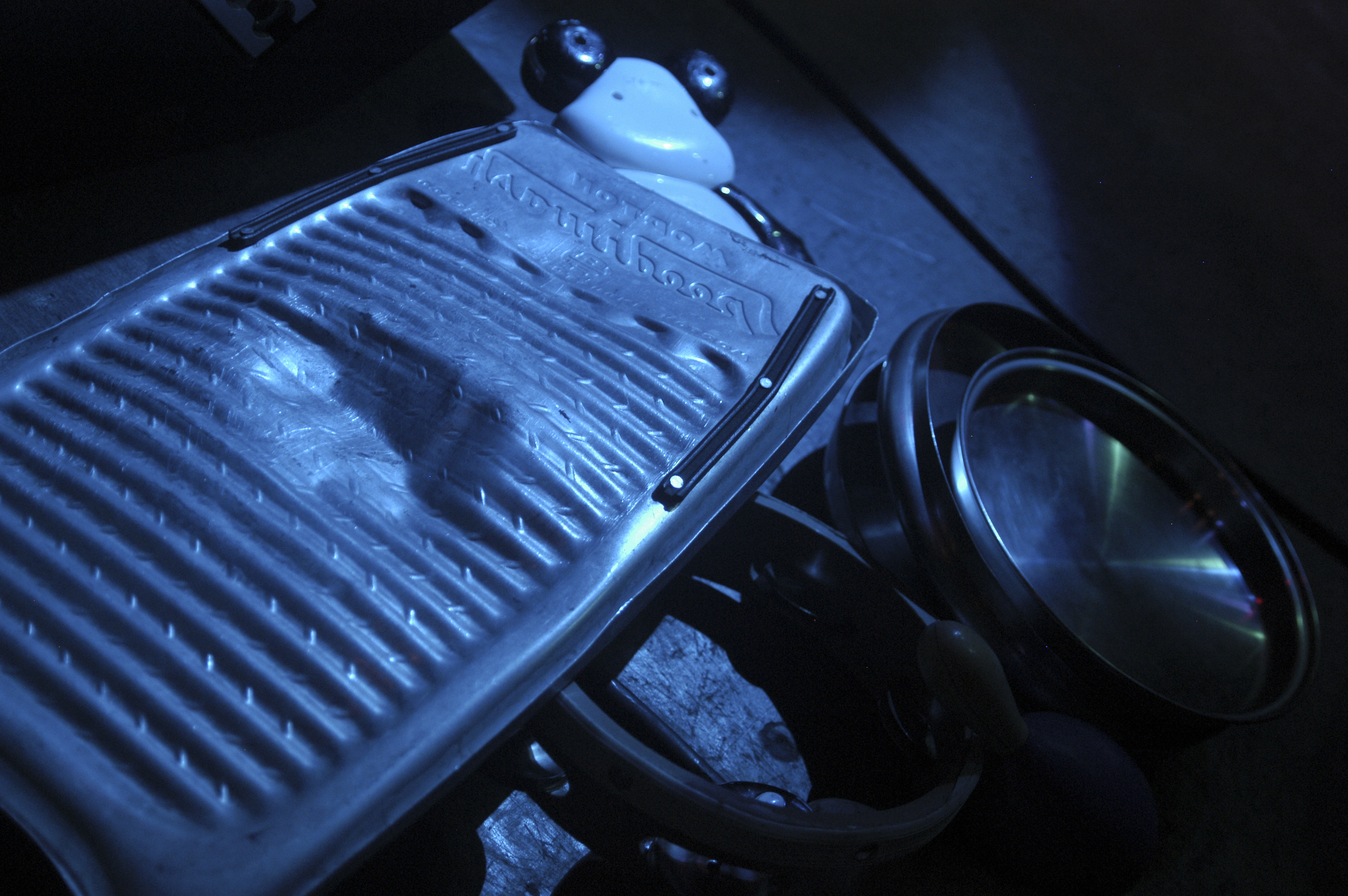 Drummer Paul Seely's surprise switch to trumpet topped off their performance and then it was off to...
Drummer Paul Seely's surprise switch to trumpet topped off their performance and then it was off to...Catch the first half of Fleet Foxes. This is one band that's got their shit together. From playing twice at Sasquatch this year (well, three times for drummer J Tillman), to signing to Sub Pop, and all the good press, it almost makes you want them to disappoint. But they don't.
Somebody must have planned their 6p.m. start time for the light, because it complimented the Foxes' airy, spiritual folk perfectly. Movement around the stage slowed as the band lulled their audience into contented amazement.
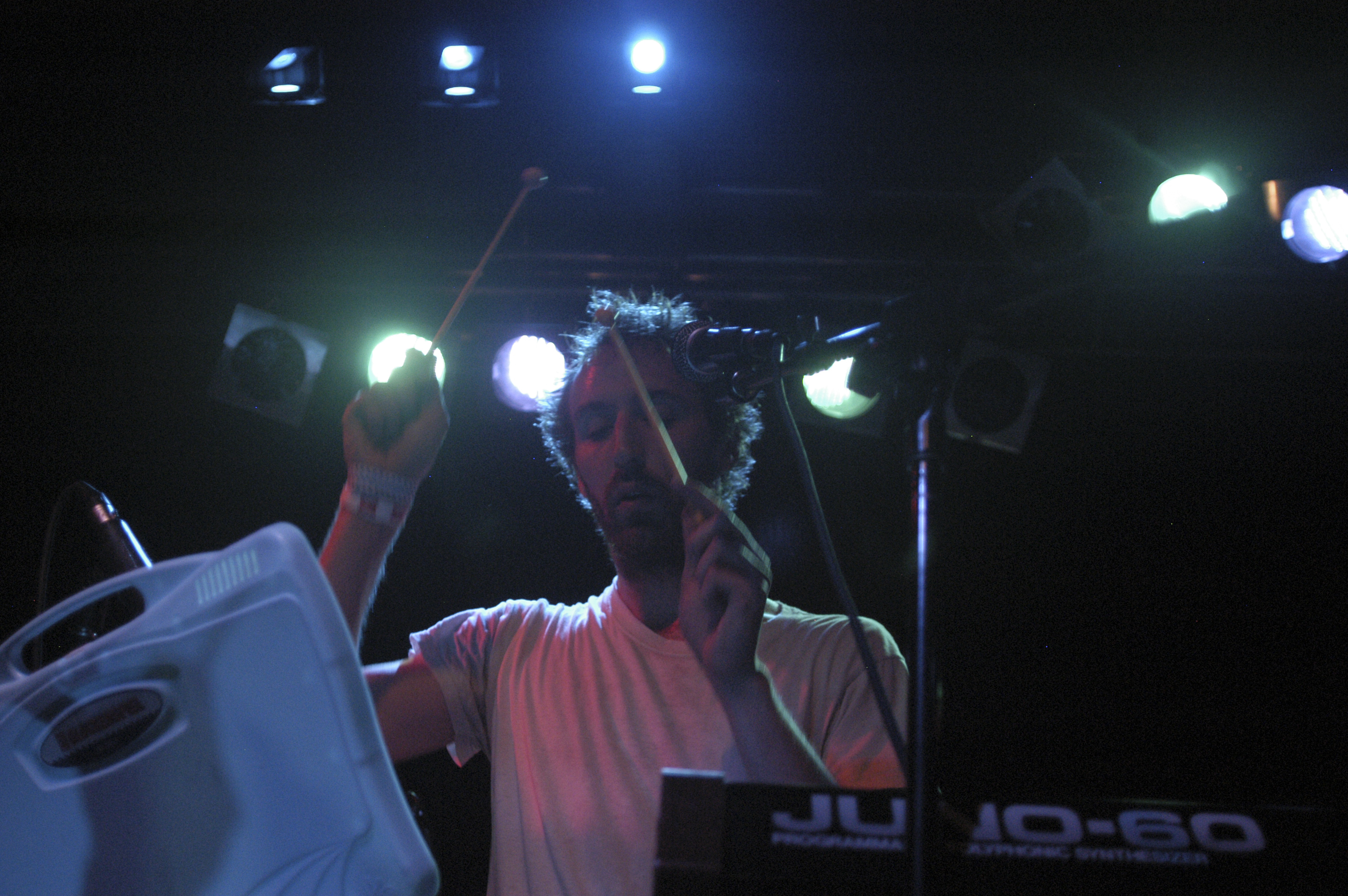
It was a whole nother story back at the Neumo's stage. Jaguar Power, fronted by former Blood Brothers singer Johnny Whitney, pumped out snarling lyrics and machine-gun drums as the bassist swayed slowly in '60s throwback white.
Throw me the Statue followed with a fun set where front man Scott Reitherman pulled out a drum and Jarred Grimes the glockenspiel, all made that much sweet by Reitherman's dreamy vocals.
Extra Bonus Scans!
Sunday, July 27, 2008
Watching The Watchers
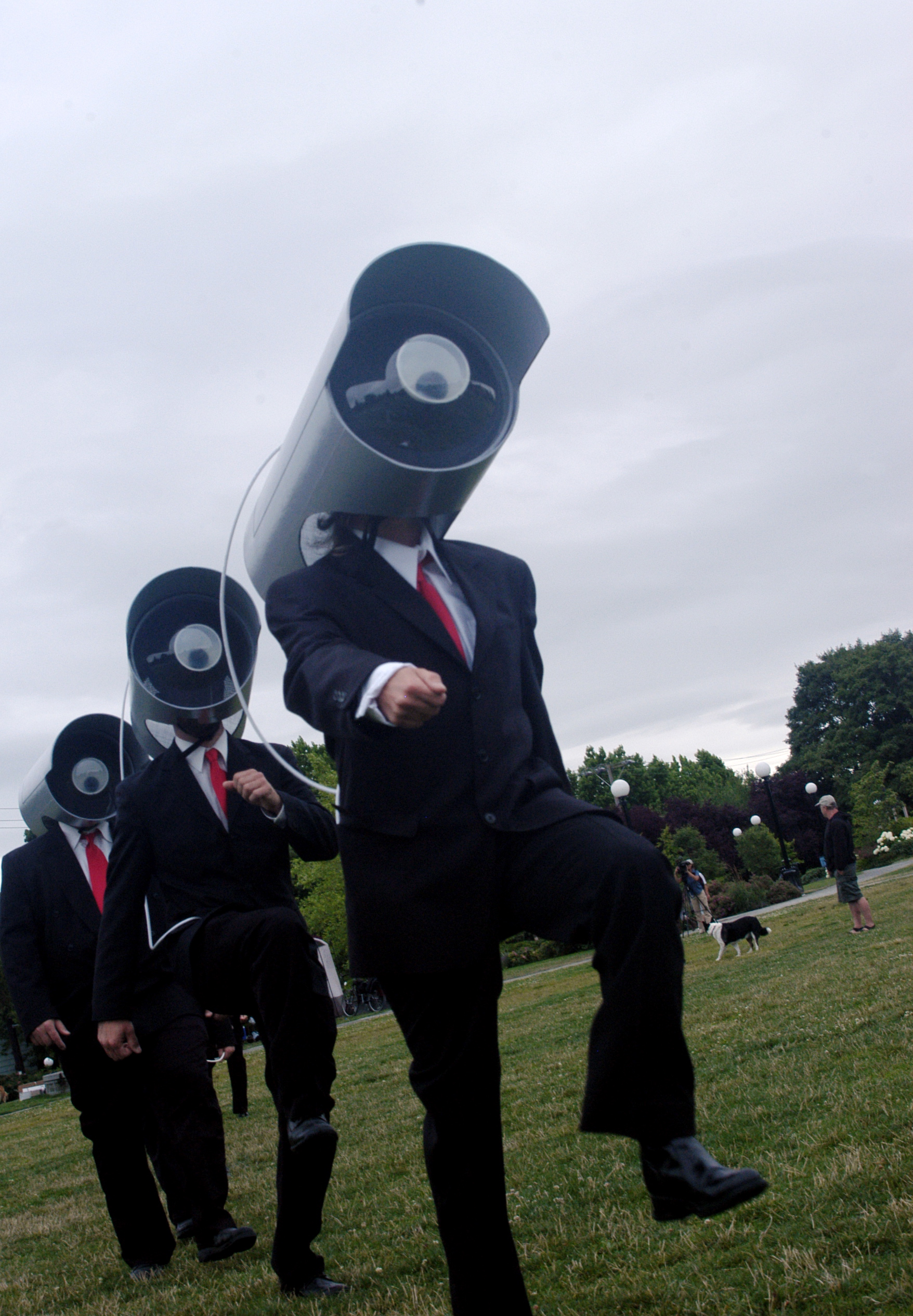 Cal Anderson Park got a little extra surveillance July 26 when several suited individuals with security cameras for heads wandered through the park as a part of the Camerahead Project.
Cal Anderson Park got a little extra surveillance July 26 when several suited individuals with security cameras for heads wandered through the park as a part of the Camerahead Project.The City of Seattle installed three security cameras in the Capitol Hill park in January despite a City Council budget proviso requiring definition of protocol for usage of the cameras, a move that surprised and upset some, including artist Paul Strong Jr.
Strong, who usually does sculpture, had just read Little Brother by Corey Doctorow, and inspired by Pablo Defendini's poster for the book depicting a suited man with a camera for a head, created the project to bring the issue to life, literally.
Working from the first model he wore to Doctorow's book reading in Seattle, Strong constructed about a dozen more Cameraheads — his name for the suited security-camera lookalikes — with either a digital camera mounted to take pictures in a parody of the security cameras, or a face-obscuring hemisphere of shiny plastic, to complete the camera look.
Strong also solicited volunteers and bought outfits at Value Village so that friends and volunteers could wander the park and bring the issue face-to-face with park users.
"It's still something watching you," said teenage Camerahead volunteer Marissa Horan, explaining why she got involved in the project. "I makes you feel like you're doing something wrong." She volunteered with 11-year-old Aidan, whom she babysits.
He echoed her concerns, "It feels like... turning 18 during the war. You don't feel very safe."
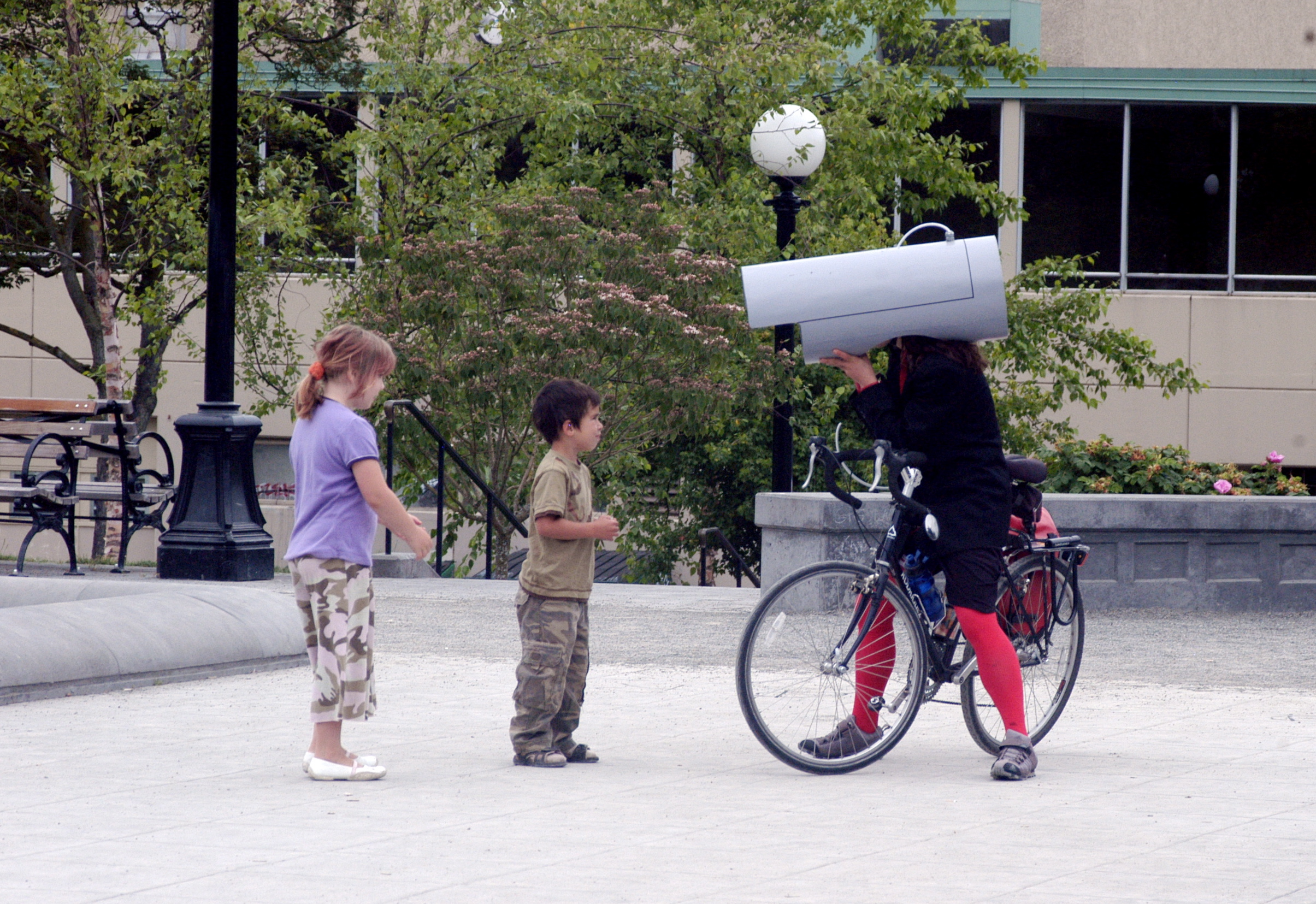
Most at the park seemed amused by the costumes, some even taking pictures and joking with the Cameraheads.
But one man, when approached by a Camerahead, shouted, "Why don't you take that shit to Olympia? You're just getting the negative reaction you expected."
Under an ordinance passed June 9, police can access footage, watch live taping, or direct the cameras in the case of a reasonable suspicion of a crime, an ongoing investigation, or in a State of Emergency.
But meeting minutes from a February 28 Parks meeting indicate that the department expected a different use for the cameras, writing "the use of camera surveillance and park rangers is to increase the public’s perception of safety in Seattle’s downtown parks."
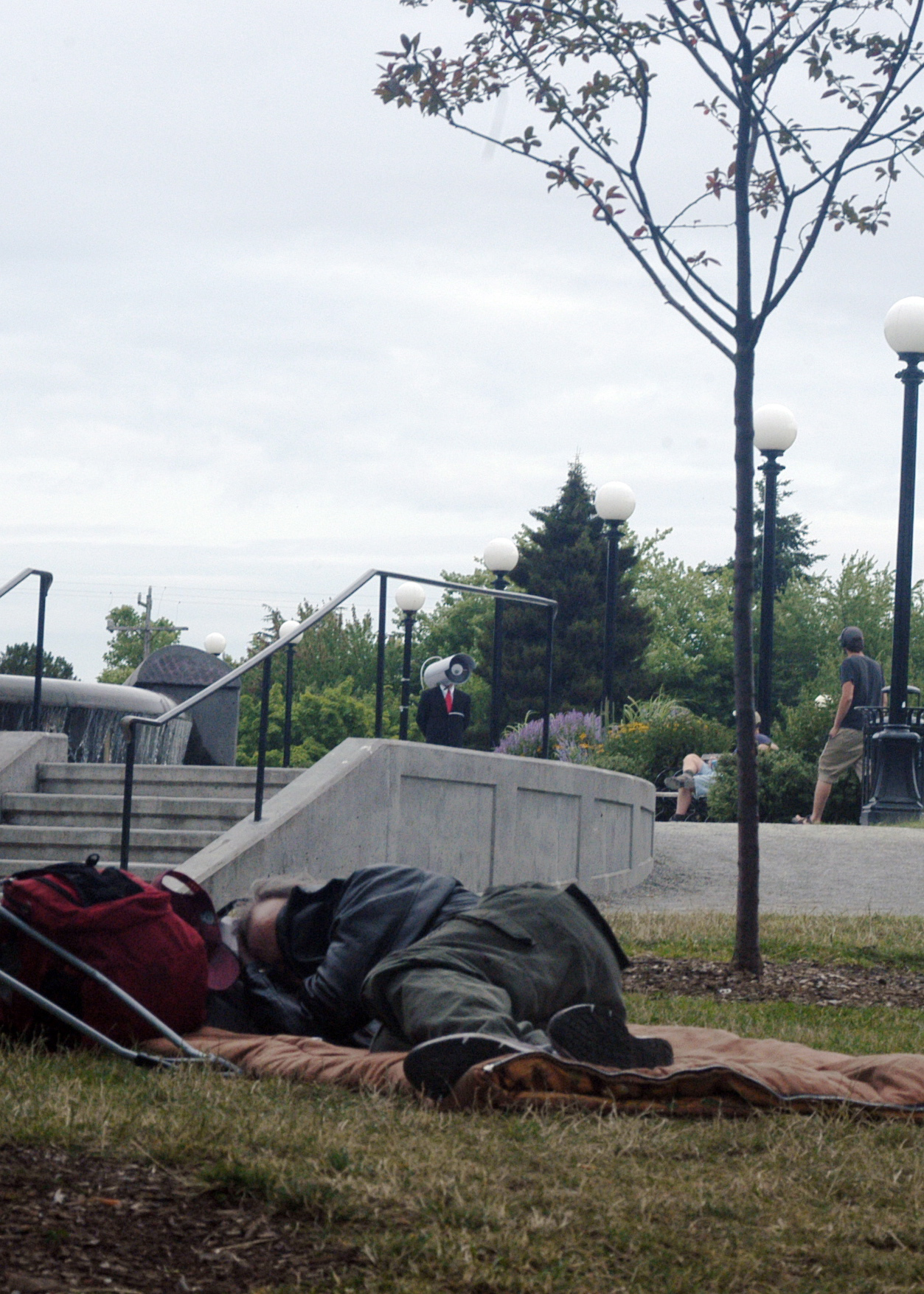
ACLU Communications Director, Douglas Honig, who passed out fliers at the event, says that the cameras are not an issue of legality but that the group is worried about growing security camera presence in public places.
The City installed cameras in the park around the same time as increasing police presence and creating the new position of Park Ranger, seven uniformed Parks employees who patrol several center-city parks. The rangers can issue Parks Exclusions for any activity prohibited by Parks or Seattle Municipal codes, which includes alcohol consumption without a permit and sleeping overnight with "sleeping equipment."
The park already had two cameras installed to monitor the reservoir before it was covered, as recommended by the Environmental Protection Agency.
Strong plans to take his project to the Burning Man arts festival in Black Rock, Nevada in August.
For Further Information:
